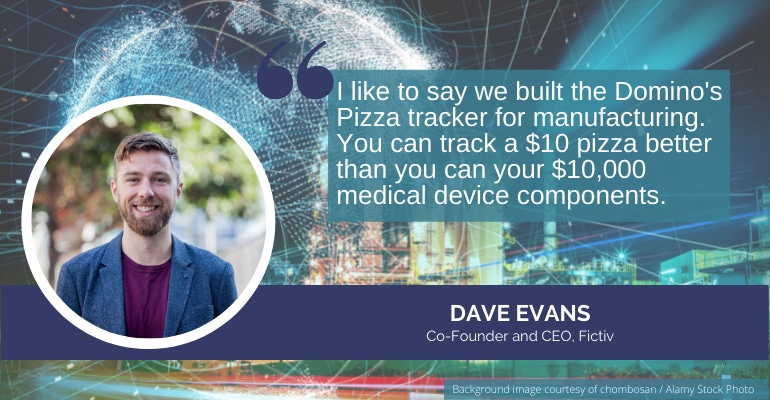'We Built the Domino's Pizza Tracker for Manufacturing'
By digitizing manufacturing, Fictiv is spoiling its customers at a time of unprecedented supply chain disruption – and its capabilities are about to get even better.
May 5, 2022

TransMed7, which will soon hit the market with its SpeedBird and Concorde breast and Heron prostate biopsy instruments, is a perfect example of how digital manufacturing can transform a business.
From inception, the startup's co-founders knew that the traditional development-to-market cost for the type of medical devices it wanted to make would be prohibitive. So TransMed7 took a different approach and leveraged Fictiv’s cloud manufacturing network.
"Before they met us they're typical development cycle was about six to seven years to make a medical device. We brought that down to a year," Fictiv CEO Dave Evans told MD+DI. "...They built just over 40 injection-molding tools with us in seven months."
It's case studies like TransMed7 that set Fictiv apart from traditional contract manufacturers, and why investors just poured $100 million into Fictiv through its series E round.
"If you think about this pace of innovation, we can talk about on-demand manufacturing, what we're doing, all the technology, how this $100 million will accelerate it, but it's how do you take a TransMed7, make sure that they can build [FDA-cleared] devices, and their business goes from a six-year development schedule down to one year? And they're producing a very high number of tools," Evans said. "I think that's a really great example of how we're driving transformation in the medical space."
Medical is about a third, if not more, of Fictiv's business, he said, and about 10% of the company's medical business is in the surgical robotics space.
"That's our other bread and butter," Evans said. "Customers that are building highly-engineered products that need, we're talking down to the human-hair width of tolerances. That's what we're doing every single day."
Fictiv's other medical device customers include Medtronic, Johnson & Johnson, and Intuitive Surgical. Outside of medical, the company also works with well-known firms like Honeywell, which turned to Fictiv specifically to help address challenges in its supply chain.
As supply chain disruptions continue to impact manufacturers across all industries, San Francisco, CA-based Fictiv is helping to decrease supply chain risk for its customers. The $100 million series E round brings the total investment in the company to $192 million.
Fictiv says its customers have seen cycle time gains of 40% or better, engineering productivity of 20% or more, and a significant reduction in operational costs associated with managing an inflated, fragmented supply chain.
Another Fictiv partner is RBC Bearings, which makes custom engineered precision bearings and products. Sean Williams, general manager at RBC Bearings, said Fictiv has streamlined RBC's workflows to reduce quoting time down from seven days to minutes or seconds, and its lead times down from weeks to days. The company began working with Fictiv in September 2021.
"This type of speed delivers real business value to us and the productivity benefits have been profound," Williams said.
Fictiv has grown exponentially since its founding in 2013 as the demand for cloud-based, virtualized manufacturing continues to skyrocket. In 2021, Fictiv saw 100% year-over-year growth in core business revenue and an 81% growth in employees.
Fictiv’s manufacturing services are accessible on-demand through a cloud-based platform to solve customer challenges across new product development, engineer-to-order parts, and maintenance, repair, and operations.
Activate Capital led Fictiv's series E round, which also includes new investors from Angeleno Group, Cross Creek, The Westly Group, and existing institutional investors including Accel, Bill Gates, G2 Venture Partners, and Standard Investments.
“Fictiv has differentiated itself as an innovative digital manufacturing solution that provides not only unprecedented speed but also scalable partnerships that deliver an immediate ROI and end-to-end business value,” said David Lincoln, managing partner, Activate Capital. “We believe Fictiv is the category leader transforming how companies like Honeywell gain unmatched productivity, efficiency, and enterprise scalability through digitized workflows that dramatically change the speed and quality of manufacturing in markets such as energy, healthcare, space, and transportation."
Aside from speed, Evans said Fictiv's quality is what keeps its customers returning. Most contract manufacturers will tout their quality, but not every contract manufacturer has the data or the transparency to back up those claims. Transparency is another way Fictiv is distinguishing itself in the industry.
"I like to say we built the Dominos Pizza tracker for manufacturing," Evans said. "You can track a $10 pizza better than you can your $10,000 medical device components."
Fictiv not only has the data to support its quality, but also sends its people to its manufacturing partners to check on quality, Evans said, which leads to better outcomes.
Fictiv customers are downright spoiled in terms of the supply chain crisis
Evans sees digital manufacturing as the future of how supply chains will operate, and Fictiv is bringing companies into that future.
The recent lockdown in Shenzhen, China is a perfect example of how digital manufacturing de-risks supply chain challenges. Due to a rise in COVID-19 cases, Shenzhen, which is one of the largest manufacturing hubs in the world, essentially went on lockdown overnight.
"At that time, we had 249 orders in flight in that region," Evans said.
If Fictiv was a traditional contract manufacturer it's hands would basically be tied.
"But because we're a digital platform in this ecosystem, in 24 hours we shifted all 249 orders to other regions with available capacity, and we had near-zero impact to lead time," Evans said. "Meaning that basically near-zero customers had any delays to their orders, and it happened, almost without them knowing it."
Click below to hear what IME West 2022 speakers and attendees had to say about the global supply chain crisis.
About the Author(s)
You May Also Like



.png?width=300&auto=webp&quality=80&disable=upscale)
